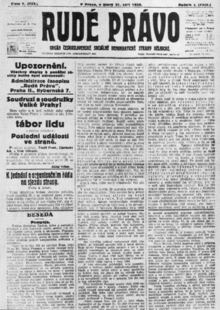Rudé právo
Rudé právo (Czech for Red Justice or The Red Truth) was the official newspaper of the Communist Party of Czechoslovakia.[1]
 First edition of Rudé právo from 21 September 1920 | |
| Type | Daily newspaper |
|---|---|
| Format | Broadsheet |
| Owner(s) | Communist Party of Czechoslovakia |
| Founded | 1920 |
| Political alignment | Communism |
| Language | Czech |
| Ceased publication | 1990 |
| Headquarters | Prague, Czechoslovakia |
| Country | Czechoslovakia |
History and profile
Rudé právo was founded in 1920 when the party was splitting from the social democrats and their older daily Právo lidu (People's Right). During the 1920s and 1930s it was often censored and even temporarily stopped. In autumn 1938 the party was abolished and during the German occupation and World War II that came soon afterwards the newspaper became an underground mimeographed pamphlet. After the communist take-over in 1948 it became the leading newspaper in the country, the Czechoslovak equivalent of the Soviet Union's Pravda, highly propagandistic and sometimes obedient to the government. Its Slovak equivalent in Slovakia was Pravda.
Rudé právo had a circulation of over one million daily, making it the most widely distributed newspaper in Czechoslovakia. The communist government promoted its sales, for example, by sometimes forbidding other newspapers to be sold before 10am, or kiosk owners might be paid to not sell other papers at all, or the presses that printed rival newspapers could just be ordered not to print them.
Following the Velvet Revolution, Rudé právo was privatised in 1989.[2] In addition, some editors founded a new daily, Právo, unaffiliated with the party but taking advantage of the existing reader base.
In popular culture
- In the book Life is Elsewhere by Milan Kundera, Jaromil, the protagonist, makes a reference to reading Rudé právo.
- In the 2006 movie Bobby, Svetlana Metkina plays a Czechoslovak reporter for Rudé právo who is granted an interview with Robert F. Kennedy.
See also
- Eastern Bloc information dissemination
References
- Milan Smid. "Czech Republic" (PDF). Mirovni Institut. Retrieved 18 November 2014.
- Daniela Gawrecká (November 2013). "Who Watches the Watchmen?" (Discussion Paper). Prague: Institute of Sociology. Retrieved 17 February 2015.